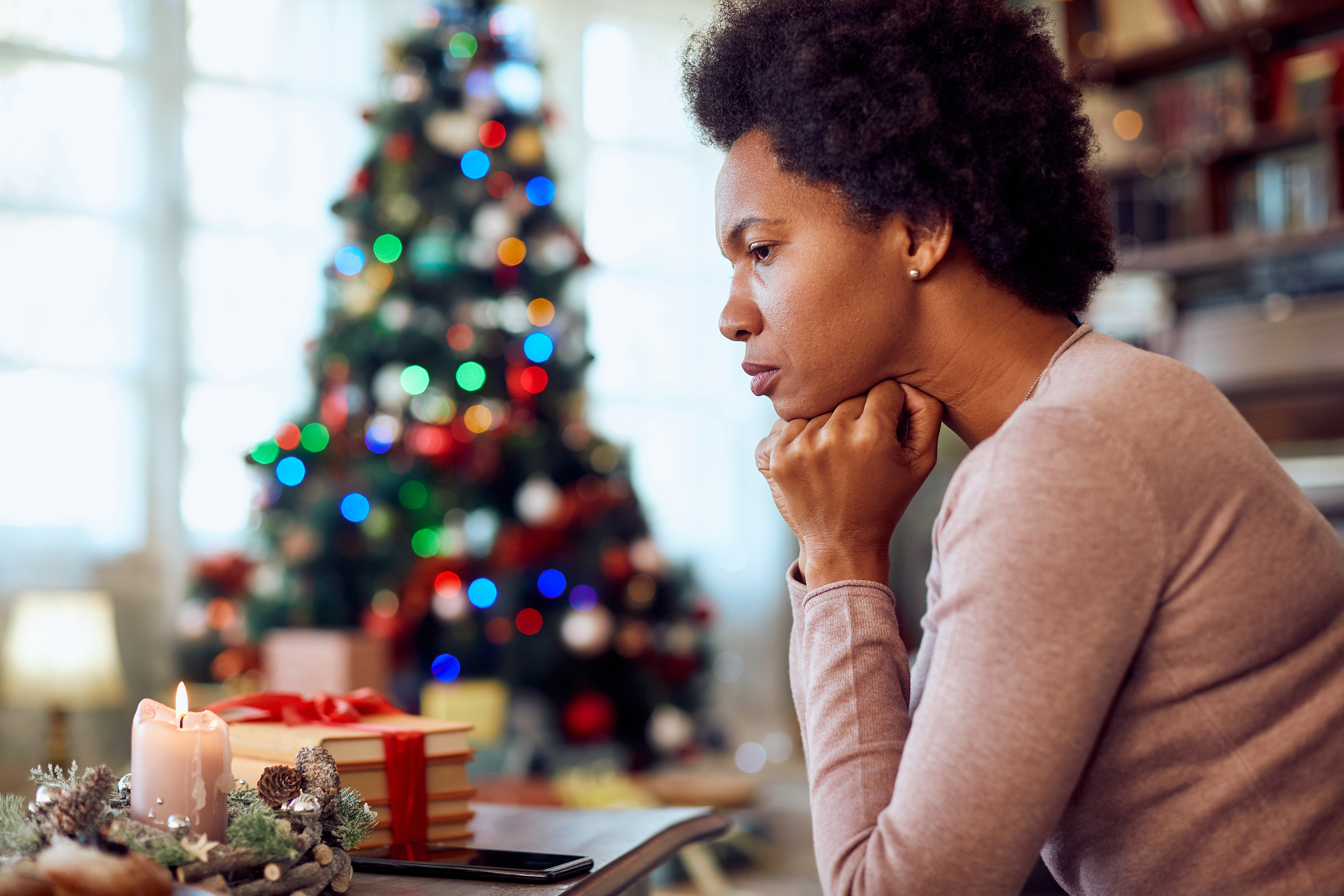Coping with Loss During the Holidays
5 min read

A cancer diagnosis brings many losses, sometimes to treasured activities, sometimes even to the lives of loved ones. Rocky Mountain Cancer Centers social worker, Lindsay Chisholm, offers tips for coping during the holidays
 While the public conception of the holiday season is one of joy, that’s frequently not the case in families whose lives have been impacted by cancer. Long before the COVID pandemic, Lindsay Chisholm, a social worker at Rocky Mountain Cancer Centers (RMCC), gave presentations to RMCC clients and employees about coping with loss during the holidays. Now, she says the subject is even more pertinent, as the world faces its second holiday season since the Coronavirus swept the globe, changing how we celebrate – and who we celebrate with – during the holidays.
While the public conception of the holiday season is one of joy, that’s frequently not the case in families whose lives have been impacted by cancer. Long before the COVID pandemic, Lindsay Chisholm, a social worker at Rocky Mountain Cancer Centers (RMCC), gave presentations to RMCC clients and employees about coping with loss during the holidays. Now, she says the subject is even more pertinent, as the world faces its second holiday season since the Coronavirus swept the globe, changing how we celebrate – and who we celebrate with – during the holidays.
“We get the message from popular culture that we should be happy, that we should be grateful to be alive – from social media, from personal relationships, internal pressure,” said Chisholm. “But, what do you do if you don’t feel good? Or you’re struggling to make the holidays a certain way, and it’s not working?” Chisholm offers many insights and tips for coping with loss during the holiday season.
Holidays Are Time of Heightened Emotion
“For all people – in particular, cancer patients and their families – the holidays are a time of heightened emotions,” Chisholm said. “This is a time of the year when emotions are more intense. Then you add cancer and look at the state of the world, and it can add to a sense of loss.”
So, why are emotions so intensified this time of year?
 First off, Chisholm pointed out, the holidays mark the passage of time. So, we’re not just looking at and experiencing this holiday, but every holiday we remember from our past. Often grief arises, as we remember loved ones who are no longer with us, or activities that are no longer possible for us, whether those “lifestyle losses” are due to cancer or to Covid precautions. For example, maybe in years past you loved playing on the floor with your grandkids, but this year your mobility is restricted to watching them from a wheelchair or seeing them through a video call instead of in-person.
First off, Chisholm pointed out, the holidays mark the passage of time. So, we’re not just looking at and experiencing this holiday, but every holiday we remember from our past. Often grief arises, as we remember loved ones who are no longer with us, or activities that are no longer possible for us, whether those “lifestyle losses” are due to cancer or to Covid precautions. For example, maybe in years past you loved playing on the floor with your grandkids, but this year your mobility is restricted to watching them from a wheelchair or seeing them through a video call instead of in-person.
Second, the holidays can be a reminder of life’s uncertainty. According to Chisholm, it’s very common to find yourself wondering “what will next Christmas look like?” While it’s exciting – and sometimes helpful – to think in terms of goals like “next Christmas I hope to be holding my first child or living in a new home,” many people find their thoughts trending in a more negative direction. Frequently, cancer patients, and many others, wonder: “Will I be here next Christmas? What will the next year bring?”
Finally, holiday celebrations are often stressful. These are events that require a lot of energy just to produce. So, they can be as much “work” as they are “fun.” Additionally, most people have high expectations of what the holidays will be like. Since the reality often doesn’t always match what they anticipated, many people feel a sense of loss during the holidays just reconciling their expectations with reality.
Tips for Coping with Loss During the Holidays
The first step for coping with loss during the holidays is to acknowledge and validate your emotions. “Give yourself grace,” said Chisholm. “There’s not a right or wrong way to feel.”
Chisholm pointed out that people going through cancer treatment, or facing other health problems, have limited energy. And it takes more energy to fight against a negative emotion – and plaster a false smile on your face – than to acknowledge the emotion and let it run its natural course.
There are many ways to cope with loss during the holidays, and Chisholm focuses on honoring and experiencing emotions instead of always turning to easy distractions. Here are her suggestions:
- Self-care. Find time, even in a hectic season, for activities that soothe and restore you.
- Recognize that emotions are temporary. Eventually, there will be space for happiness and joy within difficult emotions.
- Recognize moments of peace and hope, however fleeting, and celebrate them.
- Take an inventory of times in your life when you have coped with challenging situations. Write down things that have helped you in the past, and consider using those things now, which can also offer a feeling of empowerment and perspective on what you have already overcome.
- Whatever emotions you feel, approach them with an attitude of non-judgment, without criticism, comparison, or labels – and without trying to change them. Breathwork and mindfulness can be helpful. What do you feel in your body? Sometimes emotions have physical manifestations.
- Comparisons and expectations are the killers of joy. So, avoid comparisons – whether you’re comparing yourself to others, or to yourself in the past, or even what you expected for yourself this year.
 Find ways to honor the losses and create new memories. Perhaps a toast to lost loved ones or a memory display with pictures from past holidays.
Find ways to honor the losses and create new memories. Perhaps a toast to lost loved ones or a memory display with pictures from past holidays. - Be willing to receive help when it’s offered. Remember, it doesn’t just help you: It helps the giver, as well.
- In advance of the holidays, brainstorm with your family ways to make the holidays easier, reducing stress for everyone. Perhaps drawing names for gift-giving or dividing up tasks. Also, write yourself a “permission slip” for particularly onerous or overwhelming duties. For example: “This year, I’m not going to bother decorating” or “This year, I’m only going to buy gift cards.”
- Try out creative activities that can transform grief, such as writing, doing art, or dancing.
- Consider your priorities and try to keep them in the forefront of your mind. Sometimes the goal of a “perfect” holiday is counterproductive to what our real goals are, such as quality time with loved ones. For example, parents who are stressed and over-taxed trying to plan fun, exciting holiday activities are too frazzled to connect with their kids. In that case, a board game and hot cocoa would be more meaningful than going to Disney on Ice.
How to Help Someone Coping with Loss During the Holidays
The most important part of helping someone cope with loss is to hold space for their feelings without trying to change them. When it seems appropriate, reassure them that their emotions are temporary. And, when they’re ready, join them in finding things for which to be hopeful or grateful.
Also, don’t be afraid to seek professional help if you have concerns for someone’s safety or mental state. RMCC patients have access to licensed oncology clinical social workers, support groups, and many other mental health resources. In extreme situations, it may be necessary to call a local crisis hotline or the National Suicide Prevention Lifeline.
RMCC recognizes that cancer impacts more than just your health and can affect you long after treatment concludes. Learn more about the various resources RMCC provides to support the physical, mental, and emotional health of cancer patients.